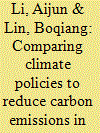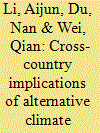|
|
|
Sort Order |
|
|
|
Items / Page
|
|
|
|
|
|
|
| Srl | Item |
| 1 |
ID:
124506


|
|
|
|
|
| Publication |
2013.
|
| Summary/Abstract |
Currently, China is the largest carbon emitter mainly due to growing consumption of fossil fuels. In 2009, the Chinese government committed itself to reducing domestic carbon emissions per unit of GDP by 40-45% by 2020 compared to 2005 levels. Therefore, it is a top priority for the Chinese government to adopt efficient policy instruments to reduce its carbon intensity. Against this background, this paper develops a general equilibrium model and seeks to provide empirical contributions by comparing the potential impacts of several different policy options to reduce China's carbon emissions. The main findings are as follows. Firstly, these climate policies would affect the structure of economy and contribute to carbon emissions reduction and carbon intensity reduction. Secondly, there would be significant differences in the economic and environmental effects among different climate policies and hence, the government would trade-off among different economic objectives to overcome any potential resistances. Thirdly, there would be considerable differences in the emissions effects of absolute and intensity-based carbon emissions controls, implying that the government might adopt different climate policies for absolute or intensity-based carbon emissions controls. Looking ahead, the government should trade-off among different objectives when designing climate reforms.
|
|
|
|
|
|
|
|
|
|
|
|
|
|
|
|
| 2 |
ID:
132607


|
|
|
|
|
| Publication |
2014.
|
| Summary/Abstract |
Because of worldwide growing concerns about global climate change, great interest has been expressed in the potential of alternative climate policies to reduce global carbon emissions. In this paper, we compare cross-country implications of alternative climate policies, including unilateral and multilateral climate policies. Our main findings are as follows. Firstly, there are large differences in cross-country effects of alternative unilateral climate policies, when the same given carbon emission reductions are achieved in each abating country respectively. Meanwhile, cross-border externalities undermine efficiency of unilateral climate policies. Secondly, there are significant differences in cross-country implications of alternative multilateral climate policies, when the same global emission reductions are allocated in several different ways among abating countries. Thirdly, it is difficult to reach a stable global climate treaty, since any abating country has the incentive to argue for small carbon emission reductions. Finally, multilateral climate policies can reduce the negative impacts of cross-border externalities, but cannot cure all cross-border externalities. Looking ahead, it will be a great policy challenge for the world to reduce carbon emissions in a cost-effective way.
|
|
|
|
|
|
|
|
|
|
|
|
|
|
|
|
| 3 |
ID:
114292


|
|
|
|
|
| Publication |
2012.
|
| Summary/Abstract |
Due to large incremental carbon emissions, China might become an important target country of CBTA (carbon motivated border tax adjustments). To levy CBTA could reduce China's emissions. Meanwhile, China's emissions reduction could also be achieved by China's climate policies (termed as CBTA-emissions-equivalent policies). This paper contributes to the discussion on CBTA by comparing the potential regional effects of CBTA and CBTA-emissions-equivalent policies. The main findings are as follows: (1) CBTA and CBTA-emissions-equivalent policies would result in relocations of outputs across regions and countries, affect the structure of economy and contribute to world's emissions reduction. (2) There would be significant differences in the regional effects between CBTA and CBTA-emissions-equivalent policies. (3) Compared to carbon tax, CBTA would be a costly and inefficient policy instrument to reduce emissions, but could function as an effective coercion strategy. (4) These policies would result in competitiveness issue and rebound effects, wherein different countries would be affected differently. China is a large economy and energy consumer with high openness to international trade. Looking ahead, the Chinese government should consider the potential interactions between China and other economies when designing tax reforms.
|
|
|
|
|
|
|
|
|
|
|
|
|
|
|
|
|
|
|
|
|